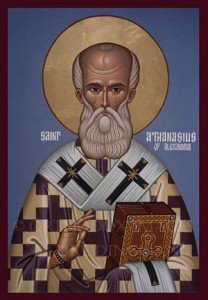In the last issue I introduced some thoughts on the theology of Athanasius the Great. He truly stood out as a prominent figure in the early church. Athanasius’ theological style was deeply philosophical. In furtherance of this cause, Athanasius employed the categories of middle Platonism and, through the ‘interlocking’ of history and salvation with ontology, he was able to present a coherent account of the Christian life. Athanasius states, ‘reality is the good, unreality is the evil. I call reality the good because it has its exemplar in God who is real; and I call unreality the evil because what has no real existence has been invented by the conceits of men.’ The evils invented by human conceits are chiefly the false gods who litter a false universe.
Athanasius is chiefly remembered for his contributions to our Eastern Christian understanding of Christ. Although he contributed to several other key areas as well, he dedicated most of his considerable talent to defending the divinity of Christ. It was left to three of Athanasius’ younger contemporaries – Basil the Great his brother Gregory of Nyssa and their friend Gregory of Nazianzus – to apply the same care and diligence to defending the Holy Spirit. The three hailed from Cappadocia in Asia Minor and, as Gregory of Nazianzus proudly claimed, of all men in the world, the special qualities of the Cappadocians are firmness in the faith and loyal devotion to the Trinity. Motivated by this loyal devotion, these three Fathers contributed to the development of patristic theology ‘a full-scale doctrine of the Trinity’, in which both the unity and the diversity could be precisely formulated within systematic theory and with a technical terminology adequate to obviate any real misunderstanding or equivocation. To appreciate this accomplishment, we need to consider the terminological problems that they faced. The divinity of the Father was axiomatic and the council of Nicaea asserted the divinity of the Son. But the place of the Spirit was still obscure. Theologians such as Athanasius were happy to appeal to the Holy Spirit in their writings and to even offer analogies in support of the divinity of the Holy Spirit.
It is important for us to remember that the Church went through years, even centuries, developing what we now believe about God, Jesus and the Holy Spirit. Jesus didn’t reveal all of the doctrine that we have. The Spirit guided the Church in developing it.

